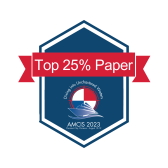Loading...
Paper Type
Complete
Description
Skilled human capital is crucial for information and communication technology (ICT) progress, yet many countries lag far behind in this demand for digital skills. In low- and middle-income countries (LMIC), inclusive technological education faces enormous challenges, such as a lack of digital infrastructure, socioeconomic instability, and low quality of formal education. Drawing upon Freire's tenets on emancipatory pedagogy and the components of human emancipation in IS literature, we investigate how local actors can promote human emancipation through ICT programs focusing on vulnerable groups. We adopted an interpretive case study associated with a Brazilian ICT program focused on human values. Our findings show that emancipatory pedagogy facilitates the understanding of human need, and the expansion of autonomy in life. However, contradictions and tensions in social impact initiatives hinder sustainable and equitable solutions. In that sense, technology is a tool that changes the world, but it must be reoriented in the right direction: solving social needs.
Paper Number
1456
Recommended Citation
dos Santos Tavares, Ana Paula; Lorenzo, Manuela Fortes; and JOIA, LUIZ ANTONIO, "Information and Communication Technology and Human Emancipation Among Vulnerable Groups" (2023). AMCIS 2023 Proceedings. 5.
https://aisel.aisnet.org/amcis2023/sig_globdev/sig_globdev/5
Information and Communication Technology and Human Emancipation Among Vulnerable Groups
Skilled human capital is crucial for information and communication technology (ICT) progress, yet many countries lag far behind in this demand for digital skills. In low- and middle-income countries (LMIC), inclusive technological education faces enormous challenges, such as a lack of digital infrastructure, socioeconomic instability, and low quality of formal education. Drawing upon Freire's tenets on emancipatory pedagogy and the components of human emancipation in IS literature, we investigate how local actors can promote human emancipation through ICT programs focusing on vulnerable groups. We adopted an interpretive case study associated with a Brazilian ICT program focused on human values. Our findings show that emancipatory pedagogy facilitates the understanding of human need, and the expansion of autonomy in life. However, contradictions and tensions in social impact initiatives hinder sustainable and equitable solutions. In that sense, technology is a tool that changes the world, but it must be reoriented in the right direction: solving social needs.
When commenting on articles, please be friendly, welcoming, respectful and abide by the AIS eLibrary Discussion Thread Code of Conduct posted here.




Comments
SIG GlobDev